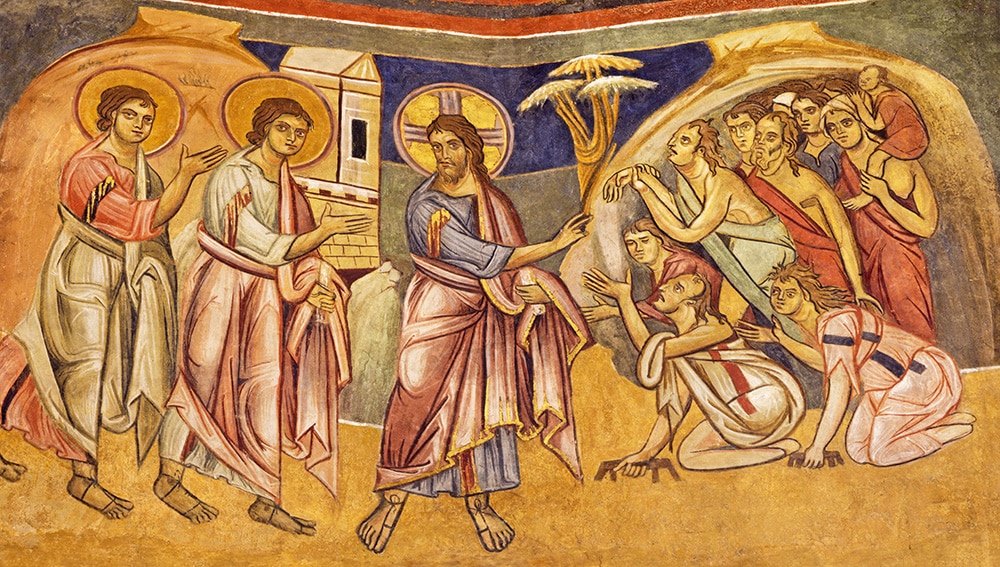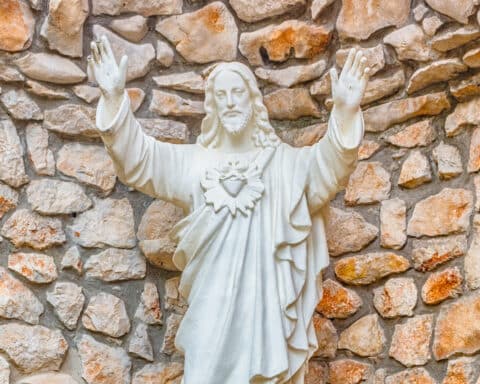
Practice social distancing.
Over the last year, these routines have come to define life in the United States.
And yet, we cannot ignore that these practices come with concurrent risks. Even if we distance ourselves from others to spare them from the virus, a consequence of social distancing is that we perceive every person as a risk to our health.
That grocery shopper with the mask pulled down under the noise, unclean.
| February 14 – Sixth Sunday in Ordinary Time |
|---|
|
Lv 13:1-2, 44-46
Ps 32:1-2, 5, 11
1 Cor 10:31–11:1
Mk 1:40-45
|
That family down the street who went on vacation last week, unclean.
Everyone could be unclean.
Through this unchosen initiation into pandemic practices, we get a sense of the misery experienced by those suffering from leprosy. The pain of leprosy is indeed physical. But like all illnesses, it is not only physical.
The leper is separated from the community, declared unclean. Lepers can no longer see their families, be part of society, or worship God in the temple.
Another example:
The leper must cover his face. He must declare himself unclean when he enters any space, allowing the crowds to scatter.
When Jesus heals lepers, he is not just ending a painful, physical ailment. Jesus is re-initiating this person into the fullness of human life.
In his healing, the leper is no longer lonely. The leper may worship God among the people of Israel.
For months, we have been waiting for a vaccine that would put an end to COVID. Sooner than later, we will close the chapter on this pandemic — even if our conclusion to the pandemic means coming to terms with the suffering and death that COVID has left in its wake.
But the vaccine will not heal every ailment that COVID has revealed.
After COVID, there will still be elderly who spend most of their days alone in nursing facilities.
After COVID, essential workers will be those most easily disposed of by corporations looking to make up profits.
After COVID, alcohol and drug abuse will continue, especially among those who are on the margins.
After COVID, not everything will be better. Not everyone will be immediately declared clean.
The Church, let us remember, is Christ’s body. We have a vocation to offer Christ’s healing presence in the world.
The Church teaches us that this vocation is expressed best in the term solidarity. Solidarity is not a “sort of” sadness that there are those in the world who are suffering.
Solidarity is ordering the life of the parish, the whole community, toward the well-fare of all.
Christ came into the world so that every man and woman might know the fullness of life, the gift of a love that surpasses human understanding.
Christ wants every man and woman to understand the dignity of their life. “I am good, because I am created.”
If the “old normal” means that we return to business as usual in our parishes, running our programs for those who show up, that is not the healing Christ came to bestow.
In our parishes, are we serious about visiting the elderly, making sure that they are never forgotten by the entire parish?
Are we setting aside money as a community for those workers in our midst who need help paying their rent?
Do we attend to the pastoral needs of those in our neighbors, suffering from alcohol and drug abuse? Do we welcome them into our Eucharistic assembly?
Christ still wants to heal the lepers of our day, those who have been declared unclean.
And he formed a Church — out of his wounded side on the cross — to continue that mission to this day.
To spread the word that there’s healing in this sin-sick world of ours through Jesus Christ.
Timothy P. O’Malley, Ph.D., is the director of education at the McGrath Institute for Church Life at the University of Notre Dame.





